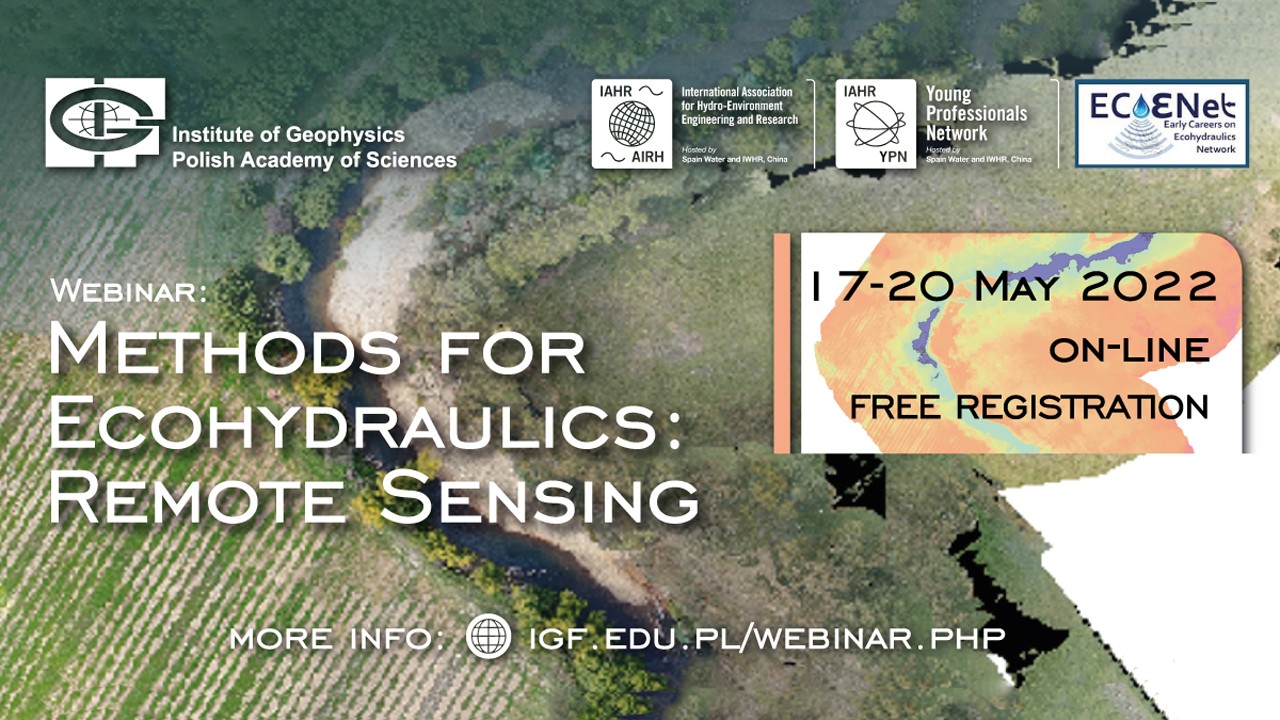Webinar on Methods for Ecohydraulics: Remote Sensing
« Back to list of video collections
Habitat modeling has become a necessary tool in evaluating the status of water environments and to support the development of strategies and plans for improving their ecological status, guaranteeing ecological benefits and reducing anthropogenic effects. Despite the rapid growth of numerical models, both hydraulics (hydraulic and morphological models) and biological (e.g., bio-energetic and individual based models) modeling, their application to fluvial systems is hindered by a lack of supporting data at spatial scales larger than a single reach (10-20 channel width) or at temporal scale beyond steady state or single event and data necessary for model performance evaluation.
Recent advances especially in remote sensing may help to address this data needs. These advances may include but not limited to technique using satellite and airborne devices (e.g., topobathymetric surveys, discharge, water surface elevation, water temperature and surface velocity, organisms’ distribution including vegetation, fish and macro-invertebrate) and or telemetry.
Thus, the Institute of Geophysics of the Polish Academy of Sciences, in collaboration with the IAHR Committee on Ecohydraulics, the IAHR Poland Young Professional Network and ECoENet, organizes a 4-day synthesis workshop focused on new tools, methods, equipment and methodologies, for monitoring water habitats with the aim to share knowledge and address such data survey needs.
This free webinar will be held on May 17-20, 2022, between 16.00 and 20.00 CET.
Through keynote lectures and technical sessions, this event aims to provide the audience with examples of novel and innovative tools for monitoring the physical and biological characteristics of water systems across spatio-temporal scales. Besides keynote lectures and technical sessions, daily roundtable discussions will further discuss such themes, to foster transdisciplinary collaborations.
We encourage contributions that describe novel and innovative remote sensing techniques to monitor biotic and abiotic quantities in water environments. The contributions should focus on methods rather than on specific scientific findings.
Contributions, which will be reviewed by the International Scientific Committee, should be in a (max) 2-page long abstract format, including figures and references. The proceedings will be published in the Publications of the Institute of Geophysics, Polish Academy of Sciences.
Selected abstracts will be invited to submit a full paper for a Special Issue on the Journal of Ecohydraulics. All the contributions will undergo the normal submission process, as per the Journal guidelines.
-
[Day1] Opening Session for Webinar on Methods for Ecohydraulics: Remote Sensing
2022-05-27 -
[Day1] Stephen Dugdale - Remote Sensing of Rive Temperature in a Changing Climate: from Knowledge to Applied River Management
2022-05-27 -
[Day1] Matteo Redana - Accurate Estimation of Water Temperature from UAV-Mounted Thermal Camera: the Use of Generalized Additive Models and Dynamic Programming Algorithm to Correct for Vignetting Effect and Thermal Shift
2022-05-27 -
[Day2] Wrap-up for Webinar on Methods for Ecohydraulics: Remote Sensing
2022-05-27 -
[Day2] Nicholas Porter - Can You Hear Me Now? An Overview of Telemetry Technologies and Their Applications
2022-05-27 -
[Day2] David Faro - Integrating Remote Sensing and 2D Hydraulic Modelling for Mesohabitat Modelling in the Aurino, a Gravel-Bed Alpine River
2022-05-27 -
[Day2] Lisa Schmalfuss - Hydraulic Modeling of a Glacial Lake Outburst Flood (GLOF) Scenario at the River Biya
2022-05-27 -
[Day2] Carmela Cavallo - Deep Learning Approach for River Hydro-Morphodynamics Monitoring Using SAR Data
2022-05-27 -
[Day2] Julien Godfroy - Processing of Hyperspectral Aerial Images to Characterise the Bathymetry of Rivers
2022-05-27 -
[Day2] Discussion for Webinar on Methods for Ecohydraulics: Remote Sensing
2022-05-27 -
[Day3] Day2 Wrap-up for Webinar on Methods for Ecohydraulics: Remote Sensing
2022-05-27 -
[Day3] Antoin O'Sullivan - A Picture Speaks a Thousand Words: Remote Sensing in Ecohydraulics
2022-05-27
